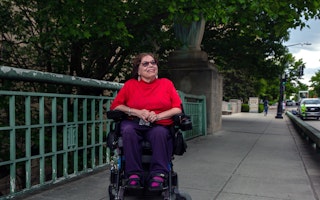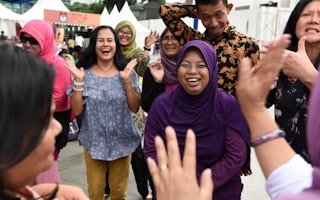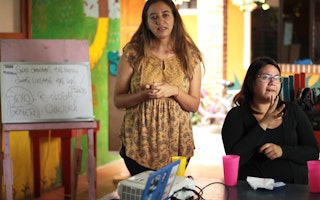A Step Forward for Children with Autism in Tajikistan
By Kate Lapham
Amina is 12 years old. She was born in Dushanbe, the capital of Tajikistan, and at the age six was diagnosed in Moscow with autism. Amina’s mother has struggled to get her support services and tried enrolling her in a mainstream school in Dushanbe. However, the school staff and teachers in Amina’s local school did not understand the special needs of a child with an autism spectrum disorder.
As a result, almost one year ago, she left school and started to attend a developmental program for children with autism spectrum disorders from 6 to 14 years old at Parents of Children with Autism Initiatives (IRODA). Amina is doing well in individual sessions with her teacher Munira, and, like any other child, she enjoys playing with her peers.
Amina’s story is typical in Central Asia. Parents of children with autism in Tajikistan have little access to information about how to support their children’s development, and they face significant discrimination.
The Soviet classification system for disabilities linked autism to childhood schizophrenia, an extremely rare mental illness. There are no state services specifically for children with autism; parents are often left to find out what they can on the internet and to work together to organize community-based services with whatever funds they can raise.
Children with disabilities, particularly genetic or neurological conditions, face tremendous stigma in Tajik society and sometimes within their own families. Commonly held beliefs blame mothers who give birth to children with disabilities of having sinned during their pregnancy. The child’s disability is a manifestation of the family’s dishonor, which can lead to divorce, shame, and the diminishing of marriage prospects for siblings in the family.
These parents, often mothers, know that their children could end up in an institution later in life if there is no one to help them and protect their right to live in the community. This adds to the uphill battle they must fight every day to make sure that their children get the services they need.
Every year on the United Nations World Autism Awareness Day (April 2), the charity Autism Speaks celebrates with a “Light It Up Blue” campaign to demonstrate the solidarity of the international autism community. The idea behind the campaign is simple—to raise awareness about autism in our communities by lighting landmarks, businesses, and homes in blue. Participating landmarks include the Empire State Building in New York, the Palacio Gobierno in Peru, the Boudha Stupa in Nepal, and the Leaning Tower of Pisa.
This year IRODA (the acronym means “willpower” in Tajik) closed the month with a concert to raise awareness about autism. Statistics on the numbers of children with disabilities in Tajikistan vary widely, but the IRODA team and the Psychological-Medical Pedagogical Committee (PMPC) have registered 93 children with autism over the past two years in Dushanbe alone—a city of 680,000.
IRODA offers community-based services to children with autism. This is possible because several parents have pooled their resources to track down information, seek additional training in working with children on the autism spectrum, and build skills in fundraising.
Although the government has signed policy documents in favor of inclusive education, there is little available to support the inclusion of children with autism in school or in the community. For each step forward, like the passing of a Concept on Inclusive Education in Parliament, there is often a step back. For example, recently, the Ministry of Health prohibited the PMPC from assessing children with autism without a diagnosis from the psychological clinic, thus creating another step for parents seeking services for their children.
In this environment, holding a concert with one of Tajikistan’s most popular boy bands dressed in blue Autism Speaks t-shirts is a huge success. An audience of teens and young families packed the concert hall, and scalpers stood outside selling tickets for 25 somoni (the average monthly wage is only 479 somoni). Between sets, the program included short documentaries explaining autism spectrum disorders in Russian and Tajik as well as performances by some of the parents and children who meet at IRODA.
Not only does this event link Tajikistan to a global movement for the rights of people with autism, it is also a huge step forward for the right of people with disabilities to participate in their communities. Rather than hiding their children at home or sending them to a residential institution, these families are proudly showing them off on stage with Dushanbe’s biggest music stars, something Amina could have only dreamed about before joining classes at IRODA.
IRODA is a grantee of the Open Society Foundations.

Until November 2021, Kate Lapham was the deputy director of the Open Society Education Support Program.


